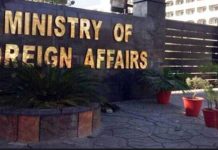ISLAMABAD, JUN 3: The Islamabad High Court has reserved its judgment on the appeals filed by the founder of Pakistan Tehreek-e-Insaf (PTI), Imran Khan, and senior leader Shah Mahmood Qureshi against their convictions in the high-profile cipher case.
The hearing, which began earlier on Monday, was presided over by Chief Justice Aamir Farooq and Justice Miangul Hasan Aurangzeb.
The cipher case, involving alleged misuse of classified information, has been a significant legal battle for the PTI leadership. Both Imran Khan and Shah Mehmood Qureshi had been convicted and sentenced earlier, leading to their appeals being filed in the Islamabad High Court.
As the hearing commenced, legal teams for both leaders presented their arguments, seeking to overturn the convictions. The defense emphasized the lack of concrete evidence and procedural errors during the initial trial.
Previous hearing
On the previous hearing, the FIA prosecutor aimed to present digital and documentary evidence, including audio and video recordings verified by experts, which were subject to cross-examination.
Justice Aurangzeb questioned whether the trial court had relied on these evidences in its decision. The prosecutor clarified that while the trial court mentioned the experts’ testimonies, it did not base its decision solely on them.
Also Read: Imran-Bushra Iddat nikkah case major update from IHC
The case revolves around the public disclosure of a cipher document by Imran Khan during his tenure as Prime Minister. The prosecutor argued that making the cipher public was a violation of official secrecy, asserting that the act compromised national security.
The prosecutor emphasized that the cipher was intended for a limited audience of nine individuals and that its disclosure had potentially benefitted other countries.
Chief Justice Farooq inquired about the criminality of merely sharing information, to which the prosecutor responded affirmatively, highlighting the detrimental impact on national security.
The prosecutor reiterated that Imran Khan’s actions, whether intentional or not, posed a risk to the country’s diplomatic relations and security.
Justice Aurangzeb raised concerns about the diplomatic repercussions of demarching an ambassador, questioning the extent to which a single individual’s actions could damage international relations. The prosecutor contended that the public disclosure of the cipher was a serious offense with broad implications.
Also Read: Imran Khan, Shah Mahmood, others acquitted in two cases
Chief Justice Farooq questioned the Federal Investigation Agency (FIA) Special Prosecutor, Hamid Ali Shah, about the specific documents used in the trial court that demonstrated external forces damaging Pakistan’s relations.
The prosecutor claimed that relations with the United States had deteriorated. However, the Chief Justice pressed for concrete evidence, pointing out that the demarche was not introduced as evidence and is not a classified document.
Justice Mian Gul Hassan remarked that issuing a warning to a country typically does not elicit a thank you. He asked what specific information from the cipher had been manipulated.
Referring to Imran Khan’s claim, the judge inquired whether the cipher stated that if the PTI founder was not removed from office, there would be serious consequences. The prosecutor confirmed that this was the message and that Khan had admitted to it.
Also Read: Cipher case: IHC scrutinises prosecution’s handling of PTI govt toppling evidence
Justice Hassan then asked the prosecution to clarify what had been altered in the cipher. The IHC CJ questioned: “Even if the accused admits to something, the prosecution still needs to prove its case. What was in the sealed envelope? What changes were made to the cipher?” He remarked that the prosecution must provide evidence even if the accused admits guilt.
Justice Aurangzeb pointed out that the exact content of the cipher remained unclear, stating, “The cipher could be a hundred pages or even a paragraph. We don’t know, the trial court doesn’t know, and the prosecution doesn’t know.” He criticized the FIA’s allegations, noting that if the PTI founder had accurately presented the cipher’s text, then what manipulation had occurred?
The Chief Justice asked straightforwardly, “Which country benefited from this? Just because everyone says so, doesn’t make it true. If everyone claims the relationship has deteriorated, it doesn’t necessarily mean it has. Someone declared war and took it to the UN. What happened?”
The Special Prosecutor replied that the PTI founder had read out the cipher texts to international media, revealing what the US had said. The prosecutor also presented the PTI founder’s statement in court.
However, Justice Mian Gul Hasan expressed skepticism regarding the reliability of these statements, noting that they could be considered political rhetoric rather than factual evidence. He questioned the prosecutor about the sources of these statements, suggesting that they may not be impartial.
The prosecutor mentioned that international media outlets like Voice of America and Deutsche Welle had reported on the matter, but Justice Gul Hasan pointed out that some of the mentioned sources were Indian newspapers, which could be biased. Justice Gul Hasan pointed out that the prosecutor had cited Indian newspapers, which the prosecutor asked to disregard.
The FIA prosecutor explained that the cipher wasn’t presented due to its sensitivity, prompting Justice Mian Gul Hasan to question why it couldn’t be presented in court. The Chief Justice asked if the head of an institution had declared the document confidential and refused to present it, and why the FIA didn’t present it in court.
The IHC Chief Justice questioned why the prosecution had not presented the cipher document in court, emphasizing that it was their responsibility to do so. He underscored the importance of providing all relevant evidence to the court.
To which the prosecutor said, “We didn’t present the cipher as evidence because the court didn’t request it.”
However, Justice Mian Gul Hasan expressed concern over the prosecution’s handling of the case, describing their approach as problematic.
Justice Mian Gul Hasan also criticized the prosecutor, highlighting the inconsistency in the prosecution’s argument. He questioned why the prosecution had not presented information regarding the cipher, especially if it supported their claims about Imran Khan’s actions destabilising the government.
In response, the prosecutor cited confidentiality as the reason for not presenting the document in court. However, the Chief Justice expressed dissatisfaction with this explanation, indicating that the prosecution needed to provide substantive evidence to support their case.
The IHC Chief Justice asked, “If we can’t mention the document in our decision, what’s the point of presenting it? It would be irrelevant to the case.”
Justice Aurangzeb remarked that “You acknowledge that the PTI founder’s version of the cipher was accurate. Why didn’t you share this information earlier, when it was relevant to the case?” To which the prosecutor said, “It was confidential, and we couldn’t disclose it. But we will present it now to support our argument.”
The Chief Justice announced that the hearing would be adjourned until the following day, expressing disappointment at the prosecution’s inability to complete its arguments. He urged the prosecution to be prepared to address the court’s questions and ensure all relevant evidence is presented.
Furthermore, the Chief Justice indicated that the Advocate General of Islamabad and state councils were expected to appear in court the next day, underscoring the significance of the upcoming proceedings.

















